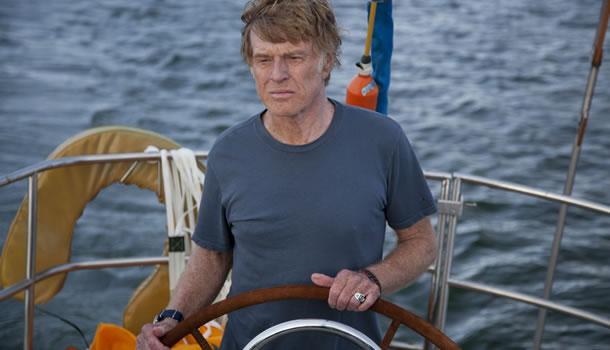 |
| Found: Water |
Generally great film is considered the little brother of great literature. How could a film convey the breadth of Dostoevsky or the winding tunnels of Faulkner without pushing the twenty hour mark and subsuming the watcher’s will to live? This little brother does have unique strengths though, as demonstrated by the quiet film All Is Lost. A nearly wordless journey adrift in the Indian Ocean, All Is Lost is a perfect example of the ways film can capture certain ideas and emotions with greater speed and subtlety than literature. In particular, All Is Lost demonstrates how simple actions and events can relate a bevy of information. Faces are designed to communicate, and you will spend a lot of time navigating Robert Redford’s cragged, set visage, relying on that map to tell you about his unspoken past, his hopes, and his philosophies.
 |
| Never should have agreed to go to Sizzler. |
The film has a cold light of dawn opening, awakening Robert Redford with an uninvited rush of water into his boat. A meaningless collision has created a serious wound, and the rest of the film will deal with the implications of it. Redford plays a nameless cypher, grappling with the immediacy of his crisis nearly silently. What words he does utter are exclaimed generally or in frustration. There are no flashbacks or muttered exposition. The director and writer, JC Chandler, has decided to let All is Lost be as broad as the ocean it sits upon. The moment to moment trials and tribulations are related with extreme specificity, but the character is a stand in for humanity, which creates an interesting balance between parable and against-the-odds thriller. As the Virginia Jean heads for storms and shipping lanes, the focus is on both nautical survival techniques and the philosophy of survival.
 |
| So that’s where the Sundance Kid got to |
Though lacking even a fiction name, Redford does infuse this character with personality. There are echoes of wealth, fastidiousness, and arrogance. In the moment, his gruff demeanor seems largely non-pulsed by the vagaries of the ocean. Rather than screaming at the ocean as usually expected from salty ship captains in Hollywood, Redford chooses instead to persist, turning in a quieter performance that subverts the bravado put on by scared men. Redford is alone; there is no one to impress by screaming at water. All is Lost skips the monologues to address the psychology of a hopeless situation. Chandler underlines the connection between Redford and the audience by keeping the camera close to Redford at all times. There are few stray shots and none outside of the sailor’s purview. Even when tossed overboard, the camera is disoriented along with Redford, tangled in the same canvas as the struggling skipper. Both director and actor have committed totally to the conceit of the minimalist survival story.
 |
| Possible spoiler : All may or may not be lost. |
This approach pays off in the subtlety of its meditation. In one scene, Redford finally allows himself to accept the possibility of failure while dealing with a raft leak. Nothing is said, there is no ticking bomb. Later a similar situation is punctuated by the film’s sole vulgar exclamation, but for now Redford has no words. Everything is worn on Redford’s visage, as he weighs the balance of his remaining resources. After days of patient determination in the face of destruction, he breaks down a little, lets on about his fear. As he bobs alone on the ocean you can see that he has crossed a tacit threshold, he has admitted to himself that he might die. This is conveyed only by body language and the context of the situation. All is Lost is built to achieve moments like this.
While on the surface the film is chiefly concerned with the details of boat repair and sextant reading, it quickly dives into the emotion and philosophy of survival. Only small changes in current and timing separate a cozy retreat in a yacht from an absurd fight for life. As Redford struggles to squeeze one more chance from fate, it becomes clear that the circumstance so neatly detailed here is actually unimportant. The unnamed sailor is us, of course, struggling vainly in the face of death. The film has something to say about us, in ways more personal and true than more explicit and talkative films. By eschewing the usual, more literate routes to philosophical inquiry and relying instead on the visual and narrative power of film, All is Lost stands out as a showcase for the medium.
4/4
**Originally Published on Synthetic Error December 21, 2013
Comments
Post a Comment